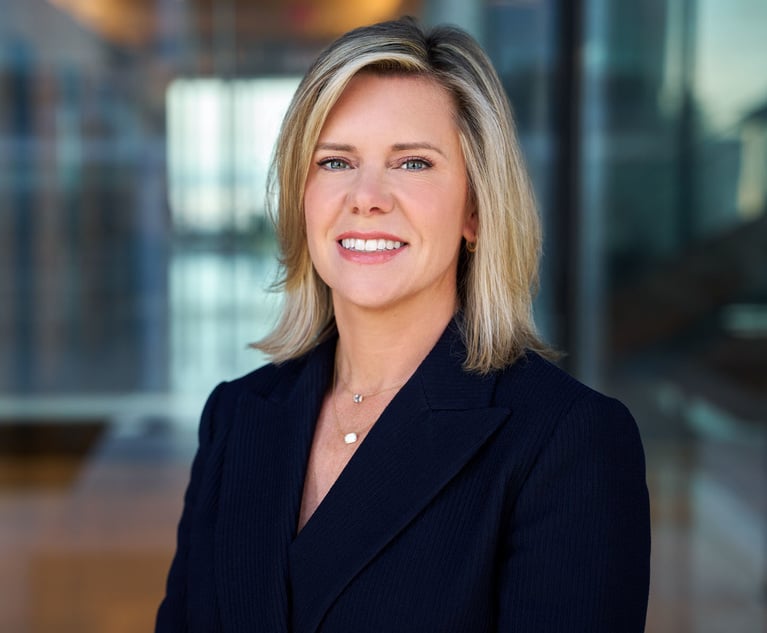Small Law Practices Frustrated With SBA's Loan Fund Program
While the Senate voted on Tuesday to add at least $310 billion to the program, some lawyers at small and midsize firms are already frustrated with the process and are still waiting to hear back on their application.
April 21, 2020 at 06:43 PM
5 minute read
 A law office and other closed businesses on Metropolitan Ave. in the Queens borough of New York early this month. Photo: Christopher Occhicone/Bloomberg
A law office and other closed businesses on Metropolitan Ave. in the Queens borough of New York early this month. Photo: Christopher Occhicone/Bloomberg
The Small Business Administration's Paycheck Protection Program, which many small law firms had hoped to use as a lifeline to avoid furloughs and other cuts, burned through its initial budget of $350 billion in loan guarantees in barely two weeks.
While the Senate voted on Tuesday to add at least $310 billion to the program, some lawyers at small and midsize firms are already frustrated with the process, expressing concern with how the government or the banks handled their application.
Several lawyers said they applied for a PPP loan and didn't receive the money. That meant more anxiety for their small and midsize law firms—many with small profit margins—as they are forced to adapt to an essentials-only economy.
Eric Turkewitz, a solo personal injury lawyer with a paralegal, said he couldn't even figure out whether Citi, his longtime bank, has received his complete application for a PPP loan. "Most people I know are supremely discouraged and exasperated trying to find out what's going on," he said about the loan program. Meanwhile, he said his practice has slowed to a crawl.
Ken Falcon, the managing partner of 23-attorney Falcon Rappaport & Berkman on Long Island, also hadn't received any money yet after applying for a PPP loan. He said his firm hasn't had to lay anyone off yet, but said he anticipated that the quarterly profit distributions that make up a big chunk of partner compensation would take a hit.
"If I were looking at average daily collections on any given day, they're off 30 to 50% from what we'd hope," he said.
A broad sweep of small firms has been impacted by the lack of the program's funding. June Castellano, a family law practitioner in Rochester who jointly leads a task force that is trying to help solos and small firms through the crisis, said in an email Thursday she's one of many lawyers who had applied for a PPP loan but hadn't gotten it.
"Today on our task force Zoom call of over 20 people, we did a quick poll, and I heard only one person say they actually got funded," she wrote.
There are some signs that clients have had better luck with the loan program than the lawyers who service them, Castellano said. Jason Rimland, a corporate lawyer at Tannenbaum Helpern Syracuse & Hirschtritt, said about 30% to 40% of clients who sought them have gotten approved for a PPP loan. He said those who worked with smaller, regional banks tended to have more success.
The PPP program, in its first round, approved $20 billion in loans to small businesses in New York and $43 billion to the professional services industry nationwide, according to SBA data. Some businesses have been approved but still have not received money.
Other programs are also available to help small law firms and other small businesses weather the pandemic. The SBA's Economic Injury and Disaster Loan program has also been swamped with applications and is set to receive more funding, though it's smaller than the PPP program.
The New York State Bar Association has asked Congress to allocate more funds for small businesses, including small legal practices.
Small Firm Demands
For plaintiffs-side litigators, who do more cases on contingency and have lumpier cash flows than Big Law firms, courthouse closures have imposed a special burden. Michelle Simpson Tuegel, a Texas solo practitioner with a national practice who usually represents plaintiffs in sexual abuse cases, said she has taken on some hourly consulting matters she wouldn't normally take on. She applied for a PPP loan and hasn't heard back yet.
"[The threat of a jury trial] holds defendants' feet to the fire," she said. "When that pressure valve is not as tight or completely turned off, it has an impact on everything down the line."
Many small firms say their services are still in demand, even if actually rendering them—filing a new complaint or motion, say, or closing a transaction—is made more difficult by delays in civil litigation, jury trial cancellations and social-distancing requirements.
And some small firms—those whose cash flow is less dependent on lawsuits, and those where clients' retainers tend to cover a great deal of necessary work—have been less immediately impacted.
Carrie Goldberg, whose firm represents clients in sexual misconduct and revenge porn cases, said April 15 that March was "fine" in terms of cash flow, and April probably would be, too, as the firm's six lawyers and six staff had time to focus on longer-term work. But she said slowdowns today could mean problems down the road.
"Making sure that there's a healthy reservoir of incoming cases is what's important," she said.
She said her firm was only approved for a PPP loan after funds were exhausted. And now she's happy that more funding will reportedly be made available, she said, given the fierce competition for funds from larger businesses that still qualify for PPP loans.
This content has been archived. It is available through our partners, LexisNexis® and Bloomberg Law.
To view this content, please continue to their sites.
Not a Lexis Subscriber?
Subscribe Now
Not a Bloomberg Law Subscriber?
Subscribe Now
NOT FOR REPRINT
© 2025 ALM Global, LLC, All Rights Reserved. Request academic re-use from www.copyright.com. All other uses, submit a request to [email protected]. For more information visit Asset & Logo Licensing.
You Might Like
View All
Orrick Hires Longtime Weil Partner as New Head of Antitrust Litigation

Profits Surge Across Big Law Tiers, but Am Law 50 Segmentation Accelerates
4 minute readLaw Firms Mentioned
Trending Stories
- 1Attorneys ‘On the Move’: O’Melveny Hires Former NBA Vice President and Assistant General Counsel; MoFo Adds Venture Capital Partner
- 2'Skin in the Game': Lawyers Call for Pressure After American Airlines Crash
- 3Apple Files Appeal to DC Circuit Aiming to Intervene in Google Search Monopoly Case
- 4A Plan Is Brewing to Limit Big-Dollar Suits in Georgia—and Lawyers Have Mixed Feelings
- 5Startup Bringing AI to Doctors' Offices Hires First GC
Who Got The Work
J. Brugh Lower of Gibbons has entered an appearance for industrial equipment supplier Devco Corporation in a pending trademark infringement lawsuit. The suit, accusing the defendant of selling knock-off Graco products, was filed Dec. 18 in New Jersey District Court by Rivkin Radler on behalf of Graco Inc. and Graco Minnesota. The case, assigned to U.S. District Judge Zahid N. Quraishi, is 3:24-cv-11294, Graco Inc. et al v. Devco Corporation.
Who Got The Work
Rebecca Maller-Stein and Kent A. Yalowitz of Arnold & Porter Kaye Scholer have entered their appearances for Hanaco Venture Capital and its executives, Lior Prosor and David Frankel, in a pending securities lawsuit. The action, filed on Dec. 24 in New York Southern District Court by Zell, Aron & Co. on behalf of Goldeneye Advisors, accuses the defendants of negligently and fraudulently managing the plaintiff's $1 million investment. The case, assigned to U.S. District Judge Vernon S. Broderick, is 1:24-cv-09918, Goldeneye Advisors, LLC v. Hanaco Venture Capital, Ltd. et al.
Who Got The Work
Attorneys from A&O Shearman has stepped in as defense counsel for Toronto-Dominion Bank and other defendants in a pending securities class action. The suit, filed Dec. 11 in New York Southern District Court by Bleichmar Fonti & Auld, accuses the defendants of concealing the bank's 'pervasive' deficiencies in regards to its compliance with the Bank Secrecy Act and the quality of its anti-money laundering controls. The case, assigned to U.S. District Judge Arun Subramanian, is 1:24-cv-09445, Gonzalez v. The Toronto-Dominion Bank et al.
Who Got The Work
Crown Castle International, a Pennsylvania company providing shared communications infrastructure, has turned to Luke D. Wolf of Gordon Rees Scully Mansukhani to fend off a pending breach-of-contract lawsuit. The court action, filed Nov. 25 in Michigan Eastern District Court by Hooper Hathaway PC on behalf of The Town Residences LLC, accuses Crown Castle of failing to transfer approximately $30,000 in utility payments from T-Mobile in breach of a roof-top lease and assignment agreement. The case, assigned to U.S. District Judge Susan K. Declercq, is 2:24-cv-13131, The Town Residences LLC v. T-Mobile US, Inc. et al.
Who Got The Work
Wilfred P. Coronato and Daniel M. Schwartz of McCarter & English have stepped in as defense counsel to Electrolux Home Products Inc. in a pending product liability lawsuit. The court action, filed Nov. 26 in New York Eastern District Court by Poulos Lopiccolo PC and Nagel Rice LLP on behalf of David Stern, alleges that the defendant's refrigerators’ drawers and shelving repeatedly break and fall apart within months after purchase. The case, assigned to U.S. District Judge Joan M. Azrack, is 2:24-cv-08204, Stern v. Electrolux Home Products, Inc.
Featured Firms
Law Offices of Gary Martin Hays & Associates, P.C.
(470) 294-1674
Law Offices of Mark E. Salomone
(857) 444-6468
Smith & Hassler
(713) 739-1250








